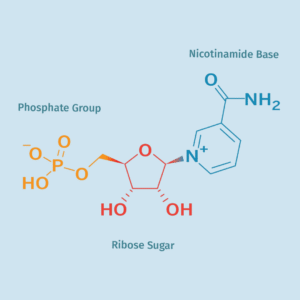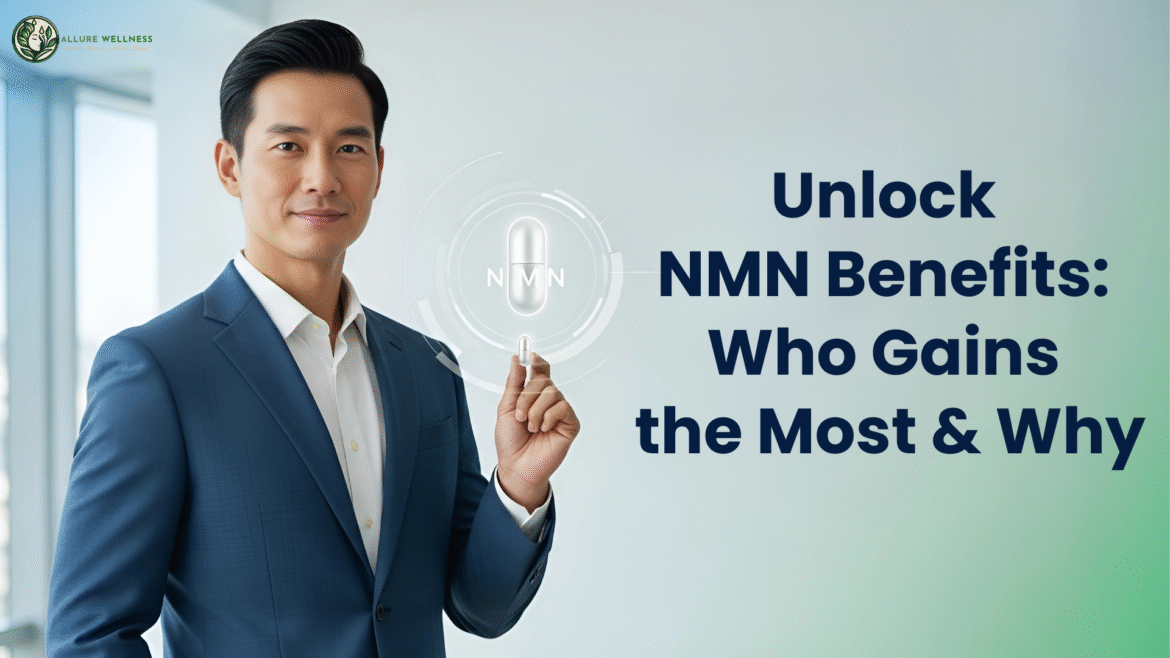NMN supplements have been making waves in the world of wellness and healthy ageing. Short for nicotinamide mononucleotide, NMN is fast becoming a hot topic among people looking to support long-term vitality.
But here’s the real question: Is NMN right for everyone, or are there certain groups who stand to gain the most?
Before you reach for a bottle, let’s unpack what NMN actually does, why it matters, and which age groups—from adults over 40 to younger individuals with specific lifestyle demands—might gain the most from adding it to their routine.
Highlights
- NMN helps boost NAD⁺ levels, supporting cellular energy, metabolism, and overall vitality, particularly as natural NAD⁺ declines with age.
- Adults over 40, younger adults with high physical or mental demands, and individuals focused on metabolic or cognitive health may benefit most.
- NMN works best as part of a holistic wellness approach including balanced nutrition, regular exercise, quality sleep, and stress management
Table of Contents
Why Does NMN Matter in the First Place?

Image from https://www.nmn.com/what-is-nmn
To understand NMN’s appeal, you first need to know about its partner in cellular health: NAD+ (nicotinamide adenine dinucleotide).
Think of NAD+ as a universal power source for your cells. It helps:
- Convert food into energy so your body can stay active.
- Repair damaged DNA, which naturally accumulates over time.
- Support healthy brain function and cognitive processes.
- Regulate circadian rhythms (your natural sleep-wake cycle).
- Keep mitochondria—the cell’s “batteries”—running smoothly.
The catch? NAD+ levels drop dramatically with age, often by 50% or more by midlife. That decline is linked to slower metabolism, less energy, and even signs of accelerated ageing.
Here’s where NMN comes in: it’s a precursor to NAD+, meaning it provides the raw materials your body needs to make more NAD+ and help counteract that decline.
What Exactly Is NMN?
NMN is a molecule derived from vitamin B3. When you take it as a supplement:
- Your body absorbs NMN through the gut.
- Specialized transporters carry it into your cells.
- It’s converted directly into NAD+.
This relatively direct pathway is why NMN has captured so much attention—it’s an efficient way to boost NAD+ without a long chain of conversions.
Who Might Benefit the Most?

1. Adults Over 40: The Primary Group
For people over the age of 40, NAD+ levels have typically dropped by half or more compared to early adulthood. That decline often shows up as:
- Lower energy levels
- Slower workout recovery
- Metabolic changes (e.g., weight gain despite similar diet and exercise)
By supporting NAD+ production, NMN may help counter these effects, supporting better energy, metabolic health, and overall vitality.
Why they benefit most: This age group is experiencing the steepest natural decline in NAD+, so supplementation can help restore levels closer to those of younger adults.
2. Younger Adults with High Demands (late 20s and above)
While NAD+ decline is less pronounced here, some younger people face higher cellular stress that may deplete NAD+ more quickly. Examples include:
- Intense athletic training or professional sports
- Chronic sleep deprivation or frequent long-haul travel
- High-stress professions (e.g., shift work, demanding corporate roles)
For these individuals, NMN might help maintain consistent energy and improve cellular recovery—even if their baseline NAD+ is still relatively high.
3. Active Individuals and Athletes of Age 30 and above
Whether you’re a weekend warrior or a seasoned marathoner, NMN’s role in mitochondrial function makes it appealing for:
- Enhanced exercise endurance
- Faster muscle recovery after strenuous activity
- Supporting overall cellular resilience
Early laboratory studies suggest NMN supplementation may improve exercise capacity and muscle strength.
4. People Concerned About Metabolic Health
If you have risk factors for metabolic issues—such as insulin resistance, prediabetes, or weight-related concerns—NMN could play a supportive role.
Some small human studies show NMN may improve insulin sensitivity and help regulate blood sugar levels. While it’s not a replacement for medical treatment, it might complement lifestyle changes.
5. Older Adults Focused on Cognitive Health
Because NAD+ is vital for brain cell protection and DNA repair, researchers are exploring NMN’s potential to support memory and cognitive function as we age.
While the data is still early, this area of research is one of the most promising—and of great interest to those hoping to stay mentally sharp.
What the Research Shows
 Longevity science is still in its early days, but the results so far are promising.
Longevity science is still in its early days, but the results so far are promising.
- Preclinical findings: In laboratory studies, NMN has been shown to support healthy metabolism and help maintain muscle function in aging models.
- Human trials: Early clinical research suggests that NMN can safely boost NAD⁺ levels and may support insulin sensitivity as well as muscle performance.
While large, long-term human studies are still underway, the growing body of evidence points to NMN as a promising ally for healthy ageing—though it’s best viewed as a supportive tool rather than a guaranteed anti-ageing cure.
Ways NMN May Support Your Daily Vitality
Thinking about adding NMN to your routine? While it’s not a quick-fix supplement, many users report gradual, steady improvements in how they feel and perform. Here’s what research and early user experience suggest:
| NMN Wellness Advantage | How It May Help You |
| Steadier daily energy | Helps cells sustain energy production, so you’re less likely to hit a mid-afternoon slump. |
| Improved workout recovery & endurance | Supports muscle repair and stamina, making it easier to bounce back after exercise sessions. |
| Healthier blood sugar & metabolism | May help maintain balanced glucose levels and support efficient metabolic function. |
| Sharper mental focus over time | Contributes to long-term brain health for clearer thinking and more consistent concentration. |
| Better skin vitality | Early research links NAD⁺ support to improved cellular repair, which can translate to a more radiant, youthful complexion. |
| Support for healthy ageing | By helping maintain NAD⁺ levels, NMN may aid the body’s natural defences against age-related decline. |
| Enhanced overall vitality | Many users simply report feeling more resilient and balanced day-to-day. |
Note: These effects are typically subtle and gradual, reflecting long-term support for cellular health rather than the instant “kick” of caffeine or energy drinks.
Safety and Considerations
Current studies suggest NMN is generally well tolerated. Reported side effects are mild and may include:
- Nausea
- Digestive discomfort
- Headaches
Because supplement quality varies widely, it’s essential to choose a reputable brand with third-party testing. And if you’re pregnant, breastfeeding, or managing a medical condition, talk to your doctor first.
Cost and Availability
NMN has become more affordable as it’s gained popularity. Prices vary, and high-quality NMN supplements still tend to cost slightly more than many other vitamins. However, for those focused on long-term cellular health and healthy ageing, many consider the potential benefits well worth the investment.
A Balanced Perspective
NMN is exciting, but it’s not a magic bullet. Think of it as part of a broader healthy-ageing toolkit that includes:
- Whole-food nutrition
- Regular exercise
- Quality sleep
- Stress management
Supplements like NMN can support your cells, but lifestyle habits remain the foundation.
Final Thoughts: Supporting Your Body for the Long Run
 So, who can benefit most from NMN? Adults over 40 often see the clearest impact, since natural NAD⁺ levels drop significantly with age. But younger adults with high physical or mental demands—such as athletes, frequent travellers, or those in high-stress professions—may also find support for energy and recovery. Even individuals focused on metabolic health or long-term brain and cellular function can see NMN as a valuable addition to their wellness routine.
So, who can benefit most from NMN? Adults over 40 often see the clearest impact, since natural NAD⁺ levels drop significantly with age. But younger adults with high physical or mental demands—such as athletes, frequent travellers, or those in high-stress professions—may also find support for energy and recovery. Even individuals focused on metabolic health or long-term brain and cellular function can see NMN as a valuable addition to their wellness routine.
If you recognize yourself in any of these groups and are curious about NMN, consider speaking with a trusted healthcare professional and starting with a reputable, high-quality product. Think of NMN not as a quick fix, but as a long-term investment in your cells’ vitality—one that works best when paired with healthy daily habits like balanced nutrition, regular movement, and good sleep. With a consistent approach, NMN can become part of a broader lifestyle that helps you age with strength and energy.
Frequently Asked Questions (FAQ)
1. At what age should you consider taking NMN?
Most research highlights the greatest benefits for adults over 40, when natural NAD⁺ levels begin to decline significantly. However, younger adults with demanding lifestyles—such as athletes, frequent travellers, or people in high-stress professions—may also benefit from the extra cellular support.
2. Is NMN safe for long-term use?
Early human studies show NMN to be well tolerated, with few and mild side effects such as slight digestive discomfort. Still, because long-term research is ongoing, it’s best to discuss any supplement plan with a trusted healthcare professional.
3. How long does it take to notice results?
NMN isn’t a quick stimulant like caffeine. Most people describe its effects as gradual—supporting long-term cellular health, energy, and recovery rather than providing an immediate “boost.”
4. Can NMN be taken with other supplements?
Yes, NMN is often combined with other common wellness supplements such as vitamin D or omega-3s. However, it’s wise to check with a healthcare provider to avoid interactions and ensure the combination fits your specific health needs.
5. How do I choose a high-quality NMN product?
Look for supplements that are third-party tested, clearly label NMN purity, and are manufactured by reputable companies. A certificate of analysis (COA) is a good sign of quality and transparency.





